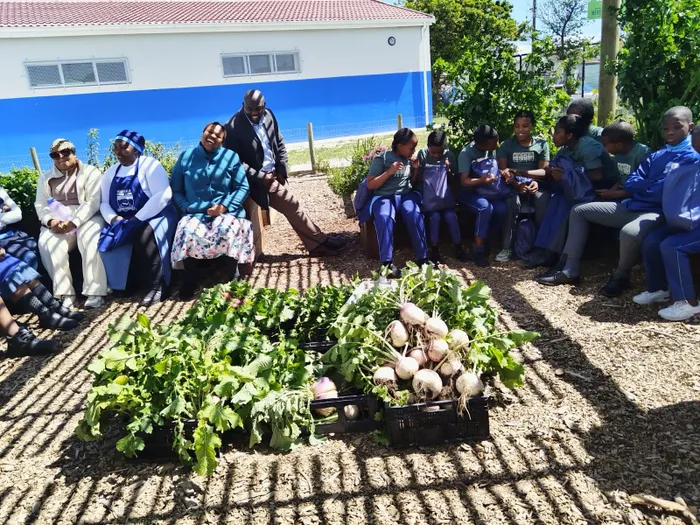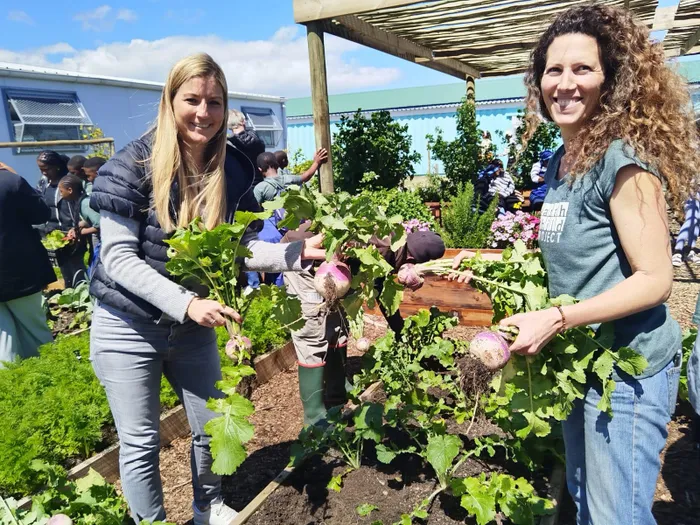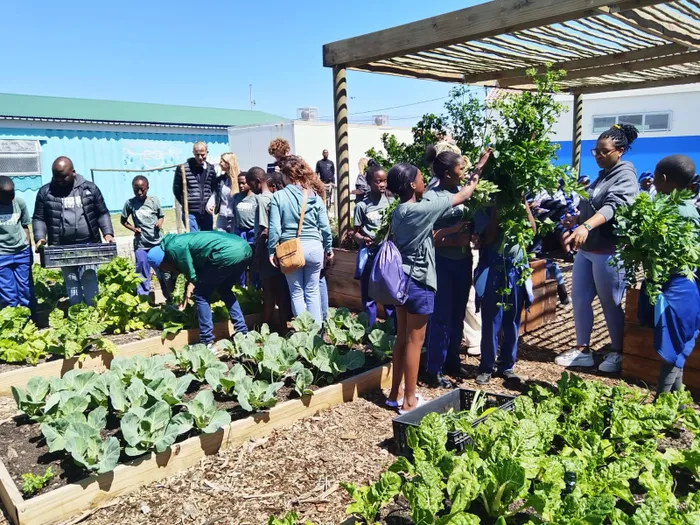Khayelitsha celebrates the launch of a sustainable food garden

Some of the harvest from the garden is on display.
Image: Phiri Cawe

Chrsitine Marhofer, right, of the garden's founders, together with director of Earthchild Garden Janna Kretzma, showing some of the harvest from the garden.
Image: Phiri Cawe

The Earthchild Project garden was officially launched on Thursday, October 2.
Image: Phiri Cawe
In the heart of Khayelitsha, something remarkable is growing not just from the soil, but from the spirit of community, resilience, and hope.
On Thursday, October 2, the grounds of Yomelela Primary School were filled with joy as vibrant music, jubilant dance, and heartfelt ululations marked the official launch of a sustainable food garden, a collaborative effort that promises to nourish not just bodies, but minds and spirits as well.
Spearheaded by the Earthchild Project, in partnership with the Nevermined Diamonds Project, Urban Harvest, and the school itself, this green oasis stands as a living testament to the community's response to pressing local challenges: food insecurity, lack of access to fresh produce, and the urgent need for sustainable practices. Once an overlooked patch of land, the garden now thrives as a vital source of nourishment, education, and empowerment for both the school and its surrounding community.
The launch brought smiles to teachers, pupils, and community members alike.
Earthchild director Janna Kretzma said the idea for the garden was conceived two years ago during a visit from the Nevermined team from Germany, who were there to build a yoga classroom at the school. Today, she proudly noted that the project has expanded to include four flourishing gardens in Khayelitsha.
“Part of the reason for establishing these gardens is that the produce goes directly to the school's kitchen to assist in the nutrition programme,” she said. Ms Kretzma emphasised the importance of environmental stewardship, saying, “Caring for the environment is a special aspect of this initiative.”
The produce from the gardens feeds directly into the school nutrition department, a fact that school principal Sibongiseni Dlaku appreciates greatly.
“This garden not only nourishes our children but has also been integrated into the school curriculum,” he said. “We need to develop our children holistically. They are learning to plant and harvest, but there is so much more involved—maths, agriculture, and even science. It also instils valuable farming skills.”
He encouraged children to plant small gardens at home to promote better nutrition.
The garden boasts a variety of vegetables and herbs, including cabbage, spinach, carrots, and broccoli. The dedicated gardeners behind this initiative, Siyabulela Jama and Nokuphiwa Jada, said there was a growing interest in gardening within the community. They encouraged residents to get creative by planting in tyres and old dishes at their homes.
Ms Jada, the school’s programme supervisor, expressed gratitude to the stakeholders for recognising the need for gardens in Khayelitsha schools. She also highlighted the potential for planting medicinal herbs.
Mr Jama shared the benefits of gardening: “With a garden, one can never go wrong. It brings positive vibrations. Once you step into the garden, your body changes. Even if you are stressed, something within you shifts. Plus, you have access to organic foods, eliminating the need to buy from shops,” he said.
Reflecting on the growth of the project, Nevermind's Christine Marhofer said she was delighted that the children and the school could now reap the rewards of their hard work.
“I am thrilled to be here after two years. We came to build a classroom, and the idea for the garden emerged then. When we saw the piece of land, we felt we could also create a garden. It looks fantastic, and we can harvest now,” she said.
The harvest celebration allowed teachers and visitors to enjoy the fruits of the garden, fostering a sense of community and shared achievement. This initiative not only addresses immediate nutritional needs but also empowers the next generation with essential skills and knowledge for a sustainable future.